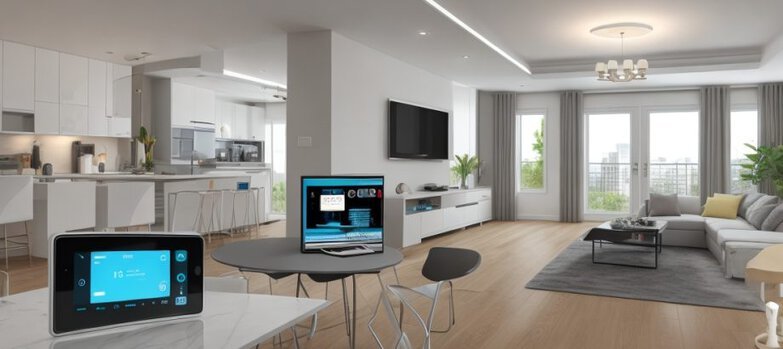Can Smart Homes Change the Future of Living

Hey there! Today, I want to talk about a mind-blowing concept that’s taking the world by storm: smart homes. These bad boys have the power to completely revolutionize our lives, and I’m here to dive deep into whether they can truly change the future of living.
So, buckle up and get ready for an eye-opening exploration of the efficiency, security, convenience, and health benefits that smart homes bring to the table.
But hey, it wouldn’t be a proper discussion without acknowledging the potential challenges they may present. So, let’s get real and take a comprehensive look at the implications and possibilities of this innovative and ever-evolving trend.
Definition – What is a Smart Home →
Are you ready? Let’s do this!
Key Takeaways
- Smart homes contribute to a sustainable and eco-friendly lifestyle by reducing energy consumption and minimizing waste.
- Smart homes offer enhanced security and safety through remote monitoring, automation of security features, and instant alerts in case of breaches or unauthorized entry.
- Smart homes provide improved convenience and comfort with features such as voice-controlled assistants, automated systems that learn and adapt to individual preferences, and remote access to smart devices.
- Smart homes integrate health and wellness aspects by tracking and monitoring wellness data, facilitating remote healthcare services, and empowering users to make informed decisions about their lifestyle choices.
Efficiency and Sustainability
Efficiency and sustainability are pivotal in shaping the future of living in smart homes. As technology continues to advance, the focus on reducing energy consumption and minimizing waste becomes increasingly important.
Smart homes enable individuals to actively monitor and control their energy usage, resulting in significant reductions in energy consumption. By integrating sensors, automation, and real-time data analysis, smart homes optimize energy usage by adjusting lighting, heating, and cooling based on occupancy and environmental conditions.
Additionally, smart appliances and systems help minimize waste by providing timely alerts and reminders to optimize resource usage. For example, smart refrigerators can monitor food expiration dates and suggest recipes to utilize ingredients before they spoil.
These innovative technologies not only enhance convenience but also contribute to a sustainable and eco-friendly lifestyle, giving individuals the freedom to live responsibly and efficiently.
Enhanced Security and Safety
Smart homes offer enhanced security and safety measures that revolutionize the future of living. With the advancements in technology, homeowners can now remotely monitor their homes and automate various security features. This provides a sense of freedom and peace of mind, knowing that their homes are protected even when they are not physically present.
One of the key features of smart homes is remote monitoring. Homeowners can access live video feeds from security cameras and monitor their property from anywhere using their smartphones or tablets. This allows them to keep an eye on their home and detect any suspicious activities in real-time. Additionally, smart security systems can send instant alerts to homeowners if there is a breach or unauthorized entry, enabling them to take immediate action.
Table: Benefits of Enhanced Security and Safety in Smart Homes
| Benefit | Description |
|---|---|
| Remote monitoring | Ability to monitor your home from anywhere using smartphones or tablets |
| Instant alerts | Receive immediate notifications in case of a breach or unauthorized entry |
| Home automation | Automate security features such as locking doors, turning on lights, and activating alarms |
Incorporating home automation into the security system further enhances safety. Homeowners can automate tasks such as locking doors, turning on lights, and activating alarms, making it seem like someone is always at home. This deters potential intruders and increases the overall security of the property.
Improved Convenience and Comfort
Smart homes offer a multitude of conveniences and comforts that enhance the overall living experience. With the integration of smart devices and automation technology, everyday tasks can be simplified and streamlined, giving individuals more time and freedom to focus on what truly matters.
Here are four ways in which smart homes improve convenience and comfort:
- Voice-controlled assistants like Amazon’s Alexa or Google Assistant allow for hands-free control of various household functions, such as adjusting the thermostat or turning on lights.
- Automated systems can learn and adapt to individual preferences, creating personalized environments that optimize comfort and energy efficiency.
- Remote access to smart devices enables users to control their homes from anywhere, providing peace of mind and convenience.
- Integration with other smart devices, such as smart TVs or home entertainment systems, offers seamless connectivity and entertainment options.
Health and Wellness Integration
The integration of health and wellness into smart homes offers numerous benefits for individuals seeking to prioritize their well-being and maintain a healthy lifestyle.
With the advent of technology, smart homes can now track and monitor various aspects of wellness, allowing individuals to have a better understanding of their health. Wellness tracking devices, such as fitness bands and smart scales, can seamlessly connect to smart home systems, providing real-time data on physical activity, sleep patterns, and even nutrition.
This integration enables users to make informed decisions about their lifestyle choices and take proactive steps towards improving their overall well-being.
Additionally, smart homes can also facilitate remote healthcare services, allowing individuals to receive medical consultations and monitor their health conditions from the comfort of their own homes.
Potential Challenges and Considerations
A significant challenge that arises with the integration of health and wellness features into smart homes is the potential for privacy and security concerns. As smart homes become more advanced and connected, there is an increased risk of personal data being compromised. This raises concerns about who has access to this information and how it is being used.
In addition to privacy concerns, there are also technological limitations to consider. Smart home systems rely on a complex network of sensors, devices, and software, which can be vulnerable to glitches, malfunctions, and hacking attempts. This could potentially put the safety and security of the occupants at risk.
Furthermore, not everyone may be comfortable with the idea of their homes monitoring and collecting data on their daily activities. The potential loss of privacy and control over personal information can be a significant drawback for those who value freedom and autonomy.
Frequently Asked Questions
How Does the Integration of Smart Home Technology Improve Efficiency and Sustainability in a Household?
The integration of smart home technology improves efficiency and sustainability in a household by enabling improved energy management and cost savings. This enhances the overall functionality and convenience of the home, making it more desirable for individuals seeking freedom in their living spaces.
What Are Some Examples of Enhanced Security and Safety Features That Can Be Incorporated Into a Smart Home?
Enhanced security and safety features that can be incorporated into a smart home include surveillance cameras, motion sensors, smart locks, and door/window sensors. These features provide peace of mind and help protect against potential threats.
How Does the Implementation of Smart Home Devices Enhance Convenience and Comfort for Homeowners?
The implementation of smart home devices enhances convenience and comfort for homeowners by allowing them to remotely control various aspects of their homes, such as temperature, lighting, and security, while also optimizing energy consumption.
Can Smart Homes Contribute to Improving the Overall Health and Wellness of Individuals Living in Them?
Smart home technology has the potential to contribute to improving the overall health and wellness of individuals living in them through features that promote mental well-being, such as smart lighting and temperature control, as well as energy-saving capabilities that reduce stress and promote sustainability.
What Are Some Potential Challenges and Considerations That Homeowners Should Be Aware of Before Adopting Smart Home Technology?
Potential drawbacks and privacy concerns are important considerations for homeowners before adopting smart home technology. These include issues such as data security, reliance on technology, and potential invasion of privacy, which should be carefully evaluated before making a decision.
